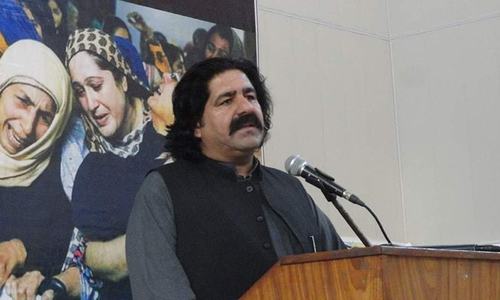ISLAMABAD: The Supreme Court will take up an appeal of Pashtun Tahaffuz Movement (PTM) leader MNA Ali Wazir on Monday against the Sindh High Court’s (SHC) judgement earlier this year that dismissed his bail application.
The plea will be taken up by a three-judge Supreme Court bench comprising Justice Umar Ata Bandial, Justice Sajjad Ali Shah and Justice Syed Mansoor Ali Shah.
On Friday, a different bench headed by Justice Sardar Tariq Masood took up the petition moved by Advocate Salahuddin Khan Gandapur on behalf of Mr Wazir but the bench ordered fixing the case for Monday after accepting the adjournment request by the prosecutor general of Sindh.
Police arrested Mr Wazir on Dec 16, 2020 in Peshawar at a request of the Sindh police, and flew him to Karachi.
Mr Wazir was arrested on the charges of making insulting and incendiary speeches against the state institutions at a PTM protest rally in Karachi on Dec 6, 2020. An FIR was lodged against him the following day in the Sohrab Goth police station.
The interned PTM lawmaker, through his counsel, approached the SHC for bail after an anti-terrorism court (ATC) in Karachi had dismissed a similar application in February this year.
The appeal has pleaded before the apex court to set aside the high court order since it is not sustainable under the law and facts. It has also stated that Mr Wazir is innocent and did not commit the offence under which he was arrested.
Moreover, the SHC and the ATC had failed to appreciate that witnesses named in the FIR challan were not independent witnesses but police personnel, the petition argued.
The petition regretted that no independent witness was cited against the appellant from the area where the public meeting was held. Therefore, a National Assembly member — who was himself struggling for the supremacy of parliament and the rule of law, the Constitution and for the democratic and human rights of the citizens — had been implicated in a false case.
The appellant had no criminal history or any other pending cases against him, the petition stated and questioned any independent evidence, direct or indirect, to connect Mr Wazir with offences like criminal conspiracy, waging war against the state, assaulting the president and governor, promoting enmity between different groups, disobeying law and order, and circulating rumours to cause mutiny.
The appeal argued that Mr Wazir was arrested and implicated in the case due to political rivalry with the ruling party.
The appeal also questioned whether the appellant was arrested and the FIR was lodged against him after seeking approval from the National Assembly Speaker Asad Qaiser.
The SHC, according to the appeal, had failed to appreciate that the appellant was entitled to bail since no independent witness was ever produced against him during the trial.
In its June 1 order, the SHC noted: “Upon a tentative assessment of the transcript of the speech which is on record, we have observed that uncouth, vulgar, obscene and uncivilized language has been used by the applicant against institutions of the state apart from language and words that may have the potential of creating disharmony and inciting provincial differences.”
The SHC also observed that it was incumbent upon all persons and institutions of the country to ensure the stability and security of Pakistan and not to incite feelings that had the potential to lead to the contrary.
The bench further noted that a healthy and constructive criticism against any person or institution, expressed in a civilised manner, should be permissible, but a distinction must be drawn between criticism and spewing venom through uncouth language, which could not be permitted on the basis of the freedom of expression when it may lead to destabilisation of the country.
Published in Dawn, November 27th, 2021














































